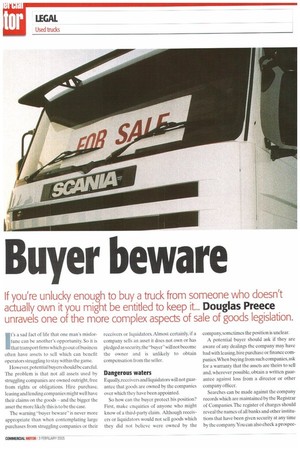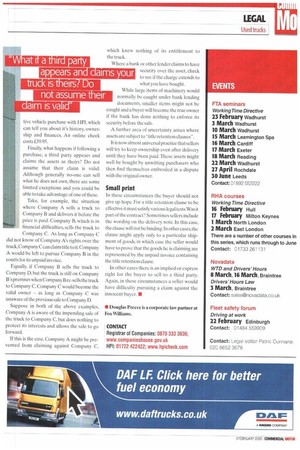Buyer beware
Page 36

Page 37

If you've noticed an error in this article please click here to report it so we can fix it.
If you're unlucky enough to buy a truck from someone who doesn't actually own it you might be entitled to keep it... Douglas Preece unravels one of the more complex aspects of sale of goods legislation.
It's a sad fact of life that one man's misfortune can be another's opportunity. So it is that transport firms which go out of business often have assets to sell which can benefit operators struggling to stay within the game.
However, potential buyers should be careful. The problem is that not all assets used by struggling companies are owned outright, free from rights or obligations. Hire purchase, leasing and lending companies might well have their claims on the goods — and the bigger the asset the more likely this is to be the case.
The warning "buyer beware" is never more appropriate than when contemplating large purchases from struggling companies or their receivers or liquidators. Almost certainly, if a company sells an asset it does not own or has pledged as security,the "buyer" will not become the owner and is unlikely to obtain compensation from the seller.
Dangerous waters Equally, receivers and liquidators will not guarantee that goods are owned by the companies over which they have been appointed.
So how can the buyer protect his position? First, make enquiries of anyone who might know of a third-party claim. Although receivers or liquidators would not sell goods which they did not believe were owned by the company, sometimes the position is unclear.
A potential buyer should ask if they are aware of any dealings the company may have had with leasing, hire purchase or finance cornpanies.When buying from such companies, ask for a warranty that the assets are theirs to sell and, wherever possible. obtain a written guarantee against loss from a director or other company officer.
Searches can be made against the company records which are maintained by the Registrar of Companies. The register of charges should reveal the names of all banks and other institutions that have been given security at any time by the company. You can also check a prospec tive vehicle purchase with HPI, which can tell you about it's history, ownership and finances. An online check costs f39.95.
Finally, what happens if following a purchase, a third party appears and claims the assets as theirs? Do not assume that their claim is valid. Although generally no-one can sell what he does not own, there are some limited exceptions and you could be able to take advantage of one of these.
Take, for example, the situation where Company A sells a truck to Company B and delivers it before the price is paid. Company B, which is in financial difficulties, sells the truck to Company C. As long as Company C did not know of Company A's rights over the truck, Company C can claim title toil. Company A would be left to pursue Company B in the courts for its unpaid invoice.
Equally. if Company B sells the truck to Company D, but the truck is still on Company B's premises when Company B re-sells the truck to Company C, Company C would become the valid owner — as long as Company C was unaware of the previous sale to Company D.
Suppose in both of the above examples, Company A is aware of the impending sale of the truck to Company C, but does nothing to protect its interests and allows the sale to go forward.
If this is the case, Company A might be prevented from claiming against Company C, which knew nothing of its entitlement to the truck.
Where a bank or other lender claims to have security over the asset, check to see if the charge extends to what you have bought.
While large items of machinery would normally be caught under bank lending documents, smaller items might not be caught and a buyer will become the true owner if the bank has done nothing to enforce its security before the sale.
A further area of uncertainty arises where assets are subject to "title retention clauses".
It is now almost universal practice that sellers will try to keep ownership even after delivery until they have been paid. These assets might well be bought by unwitting purchasers who then find themselves embroiled in a dispute with the original owner.
Small print
In these circumstances the buyer should not give up hope. For a title retention clause to be effective it must satisfy various legal tests. Was it part of the contract? Sometimes sellers include the wording on the delivery note. In this case, the clause will not be binding. In other cases,the clause might apply only to a particular shipment of goods. in which case the seller would have to prove that the goods he is claiming are represented by the unpaid invoice containing the title retention clause.
In other cases there is an implied or express right for the buyer to sell to a third party. Again, in these circumstances a seller would have difficulty pursuing a claim against the innocent buyer. •


































































































































































































